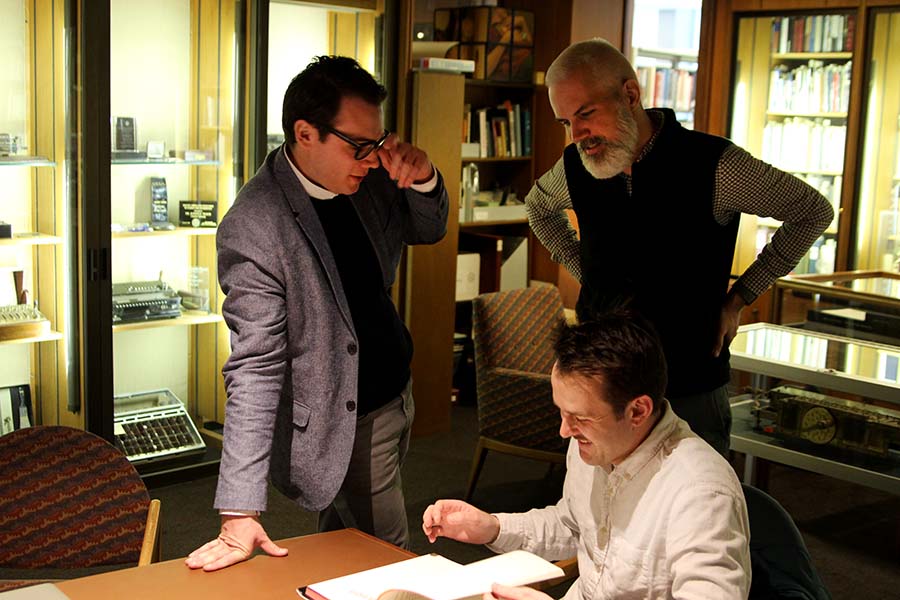It’s Alive! English Grad Students Revive Frankenstein at Posner Center
By Daniel Hirsch
In 1818, Mary Shelley imagined a monster in her novel “Frankenstein” that has captivated readers and spawned countless cultural resurrections over its 200-year history. In 2018, Carnegie Mellon University graduate students in English Steven Gotzler, Jack Quirk, and Avery J. Wiscomb have imagined a way to mark the novel and monster’s bicentennial.
In May, the efforts of a semester-long internship with the Posner Fine Arts Foundation will culminate in “The Frankenstein Complex,” a gallery show highlighting “Frankenstein”-related items from the Posner Memorial Collection of rare books. Gotzler, Quirk, and Wiscomb—all students in the Department of English’s Literary & Cultural Studies program—hope the exhibit will make attendees appreciate how questions of Shelley’s novel relate to our own historical moment.
“We’re interested in dealing with the legacy of the text broadly speaking and to join it up to the research happening at CMU,” Gotzler said. “We want to tell a different story that isn’t purely cautionary.”
Towards this aim, the trio have curated the show with artifacts connected to Shelley’s work— including the original 1818 edition of the novel— alongside items from the history of science, political thought, and literature that may have inspired Shelley as well as objects from the scientific and technological history that happened at CMU itself.

“The idea here is to reframe the idea of a monster created by humans not as a menace but a solution,” Wiscomb said. “We’re exploring what ideas do we get from what we’re calling ‘the Frankenstein Complex,’— a human-created force derived from nature?”
Wiscomb cites things like research into biomedicine and human-computer interaction as being in the legacy of Shelley’s thinking about Dr. Frankenstein and his monster.
“It’s not just a horror show,” Wiscomb said. “Thinking about manipulating nature like Shelley’s Dr. Frankenstein gets us to things like CRISPR.”
As the show’s curators, Gotzler, Quirk, and Wiscomb will divvy the Posner Center’s gallery cases into six displays organized around the novel’s most salient themes: creators, ethics, minds, bodies, nature, and revolutions. In each display, there will be historic and very contemporary content.
With the supervision of the Posner Center’s Special Collections Librarian Mary Catharine Johnsen, the team has united objects such as artist Barry Moser’s large-scale woodcut prints from his 1994 edition of “Frankenstein” alongside elastic electronics, or “smart tattoos,” engineered by CMU’s Carmel Majidi, an associate professor of mechanical engineering, and transgenetic specimens from the Center for Post-Natural History, a public-arts initiative established by CMU School of Art Professor Richard Pell.
“I love the Galvani illustrated manuscripts, those have been pretty incredible to look through,” Quirk said referring to the 18th Century copy of “De viribus electricitatis” in which the Italian scientist published detailed illustrations of his attempts to resuscitate dead frogs using electricity.
The exhibit curated by Gotzler, Quirk, and Wiscomb coincides with several initiatives that examine the cultural legacy of “Frankenstein” on its 200th anniversary. This fall, Professor of English Jon Klancher (who also serves as an advisor for the Posner exhibit) will be teaching Frankenstein@200. Klancher is also working as part of a team of digital humanists from the CMU Library and the University of Pittsburgh to create and publish an interactive digital edition of “Frankenstein.”
In “Project Frankenstein,” students from CMU’s Entertainment Technology Center are working to create an interactive VR experience that will be available for visitors of the Frankenstein@200 exhibit.
In conjunction with all these efforts, Gotzler, Quirk, and Wiscomb hope that the monster, Shelley’s prose, and, most importantly, the ideas of “Frankenstein” come to life once more for 21st Century audiences.
There will be an opening night reception of "Frankenstein Complex" for the public on Friday, May 4 starting at 5pm at the Posner Center.